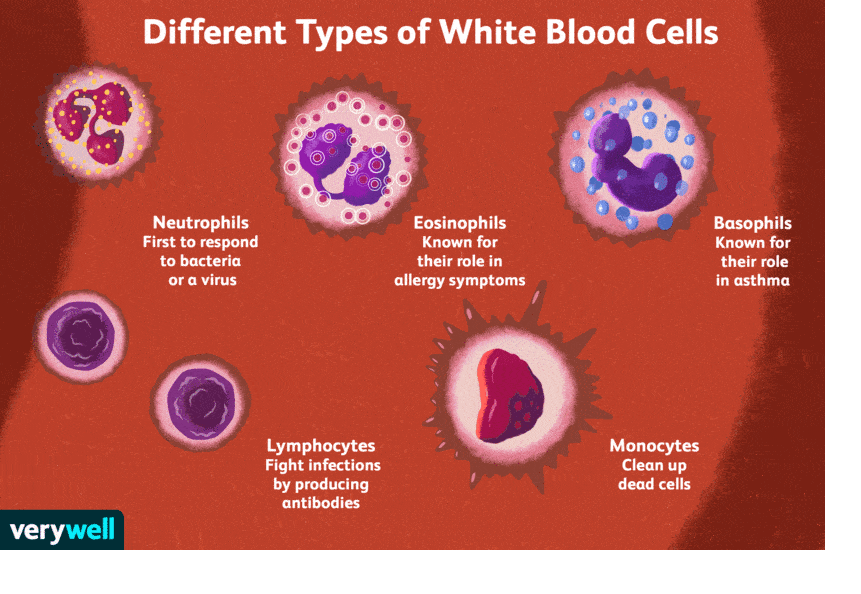The Function Of White Blood Cells: Defenders Of The Body

White blood cells, also known as leukocytes, are an essential component of the immune system and play a critical role in defending the body against infectious agents, foreign substances, and abnormal cells. These cells are produced in the bone marrow and circulate throughout the body in the blood and lymphatic system, constantly surveying for any signs of danger.
There are several types of white blood cells, each with its own unique function and specialization. Understanding the function of these cells and their role in immune defense is crucial to understanding how the body protects itself from disease and infection.
In this article, we will explore the function of white blood cells in detail, including their different types and functions, how they identify and attack foreign substances, the role they play in inflammation and healing, and the factors that can affect their count and function. We will also discuss diseases and conditions related to white blood cell dysfunction, medical treatments that target white blood cells, and ways to maintain healthy white blood cell levels and function.
By the end of this article, readers will have a comprehensive understanding of the importance of white blood cells in protecting the body and maintaining overall health.
Key Takeaways
- White blood cells are essential components of the immune system, with several types each performing a unique function.
- Maintaining healthy white blood cell levels is crucial for optimal health, and factors like stress, infection, and medication can alter white blood cell count and function.
- White blood cells have memory and can quickly identify and attack a particular pathogen, and some produce antibodies that help to neutralize pathogens.
- Autoimmune disorders cause white blood cells to attack healthy tissues, while leukemias cause abnormal growth and proliferation of white blood cells. Medical treatments like immunotherapy can target and modify the behavior of immune cells.
Types of White Blood Cells and Their Functions
Classified based on their morphology and function, white blood cells consist of several types, including neutrophils, eosinophils, basophils, lymphocytes, and monocytes, each with distinct roles in defending the body against pathogens and foreign invaders.
Neutrophils are the most abundant type of white blood cells, representing up to 70% of the total white blood cell count. They are known for their ability to quickly migrate to sites of infection and phagocytize pathogens, such as bacteria and fungi. Neutrophils release enzymes and chemicals that can destroy the pathogen, but they can also cause tissue damage if they accumulate in large numbers.
Eosinophils, on the other hand, play a role in defending the body against parasites, such as worms, and in allergic reactions. They release enzymes that can damage the parasite’s outer membrane, but they can also cause tissue damage and inflammation if their response is excessive.
Basophils are similar to eosinophils in that they are involved in allergic reactions and release chemicals, such as histamine, that can cause inflammation and vasodilation. However, their exact role in defending the body against pathogens is still unclear.
Lymphocytes and monocytes are part of the adaptive immune system and play a role in recognizing and attacking specific pathogens. Lymphocytes include B cells, which produce antibodies, and T cells, which directly attack infected cells. Monocytes can differentiate into macrophages, which phagocytize pathogens and debris, and dendritic cells, which present antigens to T cells.
The Importance of White Blood Cells in the Immune System
Crucial components of the immune system, these specialized cells play a pivotal role in identifying and eliminating foreign pathogens. Without white blood cells, the body would be vulnerable to various infections and diseases. Here are some reasons why these cells are so important in the immune system:
- White blood cells are like the soldiers of the immune system. They constantly patrol the body, searching for potential threats and attacking them before they can cause harm.
- When a pathogen enters the body, white blood cells are the first line of defense. They recognize the foreign invader and launch an attack to destroy it.
- White blood cells also have memory. Once they have encountered a particular pathogen, they can quickly identify and attack it again if it enters the body in the future.
- Some white blood cells produce antibodies that help to neutralize pathogens. These antibodies are like little weapons that can bind to the surface of a pathogen and prevent it from causing harm.
- White blood cells also play a role in the healing process, helping to repair damaged tissues and fight off infections that can occur during the healing process.
White blood cells are a crucial part of the immune system. Their ability to identify and destroy foreign pathogens, produce antibodies, and aid in the healing process makes them essential for maintaining good health. The immune system relies on these specialized cells to keep the body safe from harmful invaders, and without them, we would be much more vulnerable to diseases and infections.
How White Blood Cells Identify and Attack Foreign Substances
One of the remarkable abilities of the immune system is its mechanism for detecting and attacking foreign substances through the recognition and activation of specialized receptors on the surface of immune cells. The process by which white blood cells identify and attack foreign substances is called antigen recognition. Antigens are molecules that are not normally found in the body and can be recognized by the immune system as foreign.
White blood cells have a variety of receptors on their surface that allow them to recognize different types of antigens. These receptors are specific to certain types of molecules and can recognize a wide range of foreign substances, including viruses, bacteria, and parasites. Once a white blood cell recognizes an antigen, it becomes activated and begins to attack the foreign substance. This can involve a variety of mechanisms, including the release of chemicals that destroy the foreign substance and the recruitment of other immune cells to the site of infection.
| Receptor Type | Function | Example |
|---|---|---|
| Toll-like receptor | Recognizes pathogen-associated molecular patterns (PAMPs) | Recognizes bacterial lipopolysaccharide |
| T-cell receptor | Recognizes antigens presented by other cells | Recognizes virus-infected cells |
| B-cell receptor | Recognizes antigens in their native form | Recognizes intact virus particles |
The Role of White Blood Cells in Inflammation and Healing
Understanding the role of immune cells in inflammation and wound healing is important for developing new therapies to improve patient outcomes.
White blood cells play a significant role in the body’s response to injury and infection. When tissue is damaged, the immune system releases chemical signals, which attract white blood cells to the site of injury.
These cells help to remove debris and initiate the healing process by releasing growth factors that promote the formation of new blood vessels and tissue regeneration.
During inflammation, white blood cells release cytokines, which signal other immune cells to come to the site of injury or infection. These cytokines also cause blood vessels to dilate and become more permeable, allowing immune cells to move more easily from the bloodstream into the affected tissue.
Once they arrive, white blood cells can engulf and destroy invading pathogens or damaged cells. They can also release enzymes that break down foreign substances, further aiding the body’s immune response.
Overall, the role of white blood cells in inflammation and wound healing is critical for maintaining the body’s defense against infection and facilitating the repair of damaged tissue.
Factors That Can Affect White Blood Cell Count and Function
Factors such as stress, infection, and certain medications can alter the delicate balance of the body’s immune system, leading to changes in the number and effectiveness of the soldiers responsible for protecting against invaders.
For example, chronic stress can result in elevated levels of cortisol, which can suppress the immune system and reduce the production of white blood cells. This can leave the body vulnerable to infections and other diseases.
Infections can also directly affect white blood cells, either by stimulating their production or by killing them off. In some cases, infections can cause a rapid increase in white blood cells, such as during a bacterial infection where the body needs to produce more soldiers to fight off the invaders. However, in other cases, infections can lead to a decrease in white blood cells, such as with HIV where the virus targets and kills off the very soldiers responsible for fighting it.
Certain medications, such as chemotherapy drugs, can also affect white blood cells by reducing their numbers and weakening their function.
Overall, understanding the factors that can impact white blood cell count and function is crucial in maintaining a strong and effective immune system.
Diseases and Conditions Related to White Blood Cell Dysfunction
Several diseases and conditions are associated with the malfunction of the immune system, including autoimmune disorders, immunodeficiencies, and leukemias. Autoimmune disorders occur when the body’s immune system mistakenly attacks healthy cells and tissues, leading to chronic inflammation and tissue damage. Examples of autoimmune disorders include rheumatoid arthritis, lupus, and inflammatory bowel disease.
Immunodeficiencies, on the other hand, occur when the immune system is unable to adequately respond to infectious agents, leaving the body vulnerable to recurrent infections. This can be due to genetic defects or acquired conditions, such as HIV/AIDS.
Leukemias are types of cancers that affect the blood-forming cells in the bone marrow, leading to the abnormal growth and proliferation of white blood cells. This can interfere with their normal function, causing a range of symptoms and complications.
To further emphasize the impact of these diseases and conditions on white blood cell function, consider the following sub-lists:
- Autoimmune disorders:
- Can cause white blood cells to attack and damage healthy tissues instead of responding appropriately to invading pathogens
- Can result in a decreased number of white blood cells due to their destruction or sequestration in tissues affected by inflammation
- Immunodeficiencies:
- Can lead to recurrent infections, as the body is unable to mount an effective immune response
- Can result in a decreased number of white blood cells or impaired function due to genetic defects or acquired conditions
- Leukemias:
- Can cause an abnormal increase in the number of white blood cells, leading to impaired function and a range of symptoms
- Can interfere with the production of other blood cells, leading to anemia, bleeding, and other complications.
Overall, diseases and conditions related to white blood cell dysfunction can have a significant impact on the body’s ability to defend against infections and maintain homeostasis.
Medical Treatments That Target White Blood Cells
Medical interventions aimed at specifically targeting and modifying the behavior of immune cells have been developed to treat a range of diseases and conditions. These interventions include the use of immunosuppressive drugs, which are commonly used to treat autoimmune diseases such as rheumatoid arthritis, lupus, and multiple sclerosis.
Immunosuppressive drugs work by suppressing the activity of immune cells, which reduces inflammation and can alleviate symptoms of these diseases. Another type of medical intervention that targets white blood cells is immunotherapy.
Immunotherapy is a type of cancer treatment that uses drugs or other substances to stimulate a person’s own immune system to recognize and destroy cancer cells more effectively. One example of immunotherapy is checkpoint inhibitors, which block certain proteins on the surface of white blood cells that can prevent the immune system from attacking cancer cells.
Immunotherapy has shown promising results in the treatment of several types of cancer, including melanoma, lung cancer, and bladder cancer. However, these treatments can also have significant side effects and may not be effective for all patients.
Maintaining Healthy White Blood Cell Levels and Function
Maintaining appropriate levels of immune system components is crucial for optimal health. White blood cells are a vital part of the immune system and play a key role in defending the body against infections and diseases. Therefore, it is important to take measures to ensure healthy white blood cell levels and function.
One way to maintain healthy white blood cell levels is by adopting a healthy lifestyle. This includes regular exercise, a balanced diet, and adequate sleep. Exercise helps to improve blood circulation, which in turn stimulates the production and circulation of white blood cells. A balanced diet that includes fruits, vegetables, whole grains, and lean protein sources provides the necessary nutrients for the body to produce and maintain healthy white blood cells. Adequate sleep is also essential, as it allows the body to repair and regenerate, including the production of white blood cells.
Additionally, avoiding exposure to toxins, such as cigarette smoke and other environmental pollutants, is also important as they can negatively affect white blood cell function. To further support healthy white blood cell function, it is important to manage stress levels. High levels of stress can impair immune function, including the production and function of white blood cells. Stress management techniques such as meditation, deep breathing exercises, and yoga can help to reduce stress and promote healthy immune function.
It is also important to avoid unnecessary antibiotic use, as overuse can lead to antibiotic resistance and ultimately weaken the immune system. By taking these measures to support healthy white blood cell levels and function, individuals can help to ensure optimal immune system function and overall health.
Conclusion
In conclusion, white blood cells play a crucial role in defending the body against foreign substances and pathogens. The different types of white blood cells have specialized functions that allow them to identify and attack specific threats.
The immune system relies on white blood cells to mount a response against invading organisms, and inflammation and healing processes are also heavily influenced by their activity.
However, various factors can affect white blood cell count and function, leading to diseases and conditions related to dysfunction. Medical treatments that target white blood cells are available, but maintaining healthy levels and function should be a priority.
Overall, understanding the function of white blood cells is essential for maintaining a healthy immune system and protecting the body from harm.









